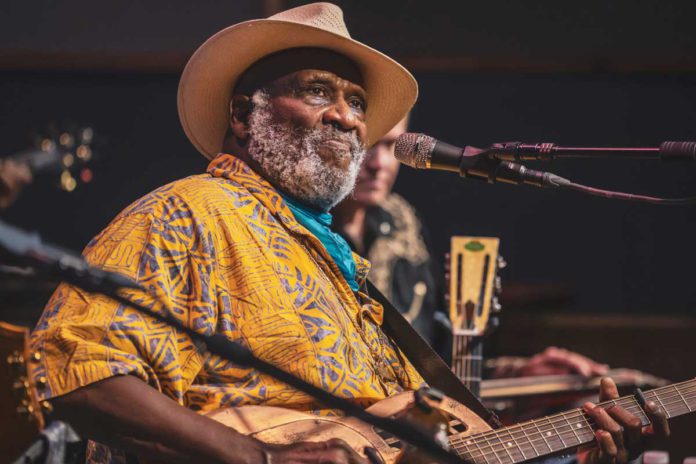Taj Mahal has anecdotes that can go on for days. Given the extraordinary musical life he’s already lived, it’s no surprise.
He got his start in 1964 as a 22-year-old joining forces with a then-17-year-old Ry Cooder to form the cult group, The Rising Sons. This quartet was the only American act invited to be part of the 1968 concert film, The Rolling Stones Rock and Roll Circus. He also landed a role acting and composing the score for the 1972 drama, Sounder. And that’s only within the first decade of his 60-year career.
Along the way, Mahal (born Henry St. Claire Fredericks Jr.) used his studies in ethnomusicology at the University of Massachusetts as a springboard toward infusing his blues, jazz and gospel influences with myriad musical nuances drawn from reggae, zydeco, country blues, R&B and Caribbean and African music sources that had him creating what became world music before it ever was given that name.
And now his latest outing, “Swingin’ Live at the Church in Tulsa,” found the 81-year-old multi-instrumentalist releasing a set recorded at the Oklahoma studio founded by old friend and influence, the late Leon Russell.
Planning the tour came next, with Mahal taking his longtime quartet—bassist Bill Rich, drummer Kester Smith, guitarist/Hawaiian lap steel player Bobby Ingano—and augmenting it to a sextet with dobro player Rob Ickes and guitarist/vocalist Trey Hensley (Mahal’s upcoming Luther Burbank Center show will be a quintet, however).
“On this tour, what’s going to happen is that it’s going to be the connection and collaboration of the parent music from all the finger picking and all the early American guitar music,” Mahal said with a smile.
The son of an Afro-Caribbean jazz arranger and piano player (his folks were from St. Kitts-Nevis) and a southern educator, the young Henry St. Claire Fredericks Jr. benefited from parents who grew up during the Harlem Renaissance and were happy to proudly educate their son about the family’s Caribbean and African ancestry. Much of it was accomplished by exposing him to what was being played on the radio, along with encouraging their progeny to pursue music.
The young musician sated his musical thirst by starting to sing when he was about four or five, followed by piano lessons and then “messing with the clarinet, the trombone and harmonica for a little bit,” he recalled.
And the natural interest he had as a kid evolved into his becoming a sort of Johnny Appleseed of music that’s found him not only learning at the feet of such giants as Muddy Waters, Elizabeth Cotton, Buddy Guy, Lightnin’ Hopkins and Howlin’ Wolf, but becoming a mentor for another generation of younger, Black guitarists, including Keb’ Mo’, Alvin Youngblood Hart, Corey Harris and Guy Davis. It’s a tradition that comes naturally to Mahal and one he gladly embraces.
“Now, I’m looking back at [my path], and it all started with the natural interest of a kid,” he said. “If I had been in a village somewhere in Africa, it wouldn’t have been weird. In this paradigm, you’re supposed to do this or that. There, the old men that are playing the music see the young kid coming up. He’s not close, but he’s standing right there. But they’re not going to go to him. He has to come to the music. You know what I’m saying? I just really enjoyed the music, and I really enjoyed the opportunity to hear so many different kinds of music.”
The Taj Mahal Quintet tops the bill with the Elvin Bishop & Charlie Musselwhite Duo, 7pm, Saturday, July 20, at the Luther Burbank Center for the Arts, 50 Mark West Springs Rd., Santa Rosa. Tickets start at $76.70 and are available at lutherburbankcenter.org/event/taj-mahal24.









